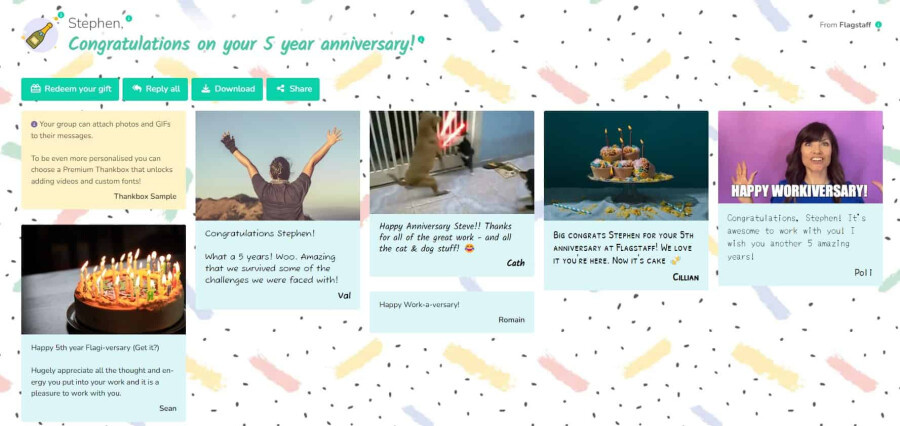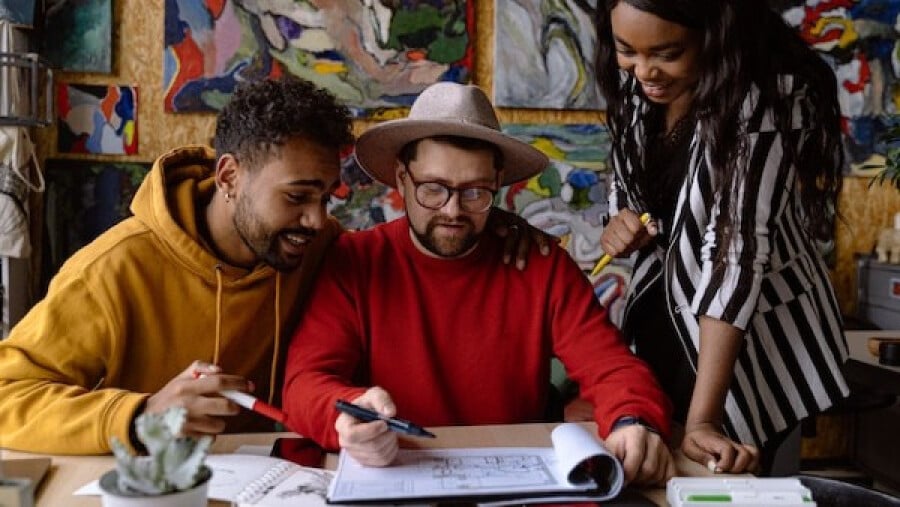The Art of Building Rapport with Your Colleagues: 5 Key Techniques


Imagine you walk into the office and the atmosphere is buzzing with energy. Teammates collaborate smoothly, conversations flow naturally, and you feel part of a well-oiled machine. This isn’t a daydream – it’s what workplaces look like when colleagues share strong rapport.
But if you’ve ever felt like a fish out of water at work – you’re not alone. The good news? Rapport-building is an art, not a mystery. With the proper techniques, you can transform awkward interactions into meaningful conversations.
Ready to become the Graham Norton of workplace dynamics? In this Thankbox article, we’re exploring five techniques to elevate your rapport-building skills. From mastering active listening to finding common ground, these strategies will help you create a more harmonious workplace.
Let’s get started!
What is rapport in the workplace?
First, let’s get a handle on what we mean by rapport. Think of it as a cosy, in-sync connection between colleagues. It’s not just about being friendly – it’s about establishing meaningful bonds that encourage open workplace communication and collaboration.
Once you achieve this level of rapport, each interaction becomes smoother due to an unspoken sense of trust between your team members.
What are the benefits of building rapport in the workplace?
Building rapport with your colleagues offers benefits beyond just feeling great at the office. Here are three advantages:
Enhanced team collaboration: With great connections, team members feel comfortable sharing their thoughts and ideas without fear of judgement. This opens the door for creativity, improving staff morale and making the work environment genuinely enjoyable.
Boosted job happiness: Fostering positive bonds at work paves the way for a more rewarding professional journey. Team members who share a deep rapport tend to be more devoted to their tasks, leading to higher productivity.
Professional advancement: Good rapport can be a catalyst for career growth. Positive relationships within the workplace lead to new opportunities, mentorships, and the potential for upward mobility. Your network within the organisation can become a valuable asset for future career steps.
If you’re looking for a convenient way to cement these benefits, consider utilising Thankbox. This group e-card tool improves relationships at work by allowing you to send tailored messages of gratitude, acknowledgment, and motivation to your teammates.

Whether it’s a quick thank-you for a job well done or celebrating a team member’s special milestone, using Thankbox amplifies the effects of good rapport. You can also send a Thankbox gift card which can serve as an extension of your efforts to create a harmonious and buzzing work environment.
Take a lead and share the team's appreciation of others with a Thankbox. You'll build rapport, boost bonds and drive productivity. It takes seconds and involves everyone.
How to build rapport with your colleagues
Feeling a little anxious about breaking the ice with your colleagues? Don’t sweat it – you don’t have to be a social butterfly to build genuine connections at work! You’ve got your own unique set of skills that can turn hallway chats into meaningful connections.
Let’s take a look:
1. Active listening
Active listening goes beyond just hearing words. It’s about fully engaging in a conversation to understand the other person’s viewpoint. This involves not just your ears but also your attention, body language, and empathetic responses.

Active listening is a cornerstone in building rapport as it demonstrates you value their thoughts and feelings. When people feel heard, trust comes next, paving the way for an effective working relationship and peer-to-peer recognition.
Thankfully, improving your active listening skills isn’t complicated. Try nodding to show agreement and understanding and mirroring the speaker’s expressions to indicate clarity.
2. Open and honest communication
Open communication isn’t just about speaking your mind (we’re not talking about an ‘Only Way is Essex’ episode, here) – it’s about creating a safe space where transparency is the norm rather than the exception.
To do this, make yourself approachable – smile, maintain eye contact, and show genuine interest. Use “I” statements to express your opinions rather than casting judgement on others. Say, “I feel we could improve our project by doing…” instead of “You should do…”
3. Offering help and assistance
Offering help can take various forms, from handling a particular part of a project to sharing resources or expertise. It’s not just about the big gestures. Sometimes, small acts like offering to make a coffee run can boost the camaraderie in a team.

The key here is to offer help without expecting anything in return. Team members will be more likely to seek your advice or assistance in the future due to your selfless act.
To do this effectively, be observant and attentive to the needs around you. Don’t wait for someone to ask for help – offer it proactively if you notice a need. However, stay respectful because no one likes unsolicited advice or interference.
4. Finding common ground
Finding common ground means discovering shared interests, goals, or opinions with someone else. Think of it as the “same here!” moments that connect us. These moments are more than just icebreakers – they’re essential for building rapport.
When people recognise that they have something in common, it’s easier to encourage an atmosphere of mutual respect and understanding.
Ask open-ended questions about work projects, weekend plans, or even the latest Netflix binge. Be attentive to what gets a positive reaction, and dive deeper into those topics. And don’t overlook professional common ground.
5. Giving and receiving feedback
Feedback is a two-way street that has the power to elevate relationships. When done constructively, feedback fosters professional growth and, most importantly, builds trust. It shows that you care enough about their journey to share your thoughts and are open enough to listen to theirs.

Aim for a balanced approach – sprinkle in the positives with areas for improvement. Be specific, concise, and direct. When you’re on the receiving end, listen attentively and ask for clarification if needed. Also remember, don’t get defensive.
Build first-rate rapport with Thankbox
Building rapport with your colleagues is far more than a nicety. It can make or break your team dynamics, job satisfaction, and career trajectory. It’s like the secret sauce that transforms a good work environment into a great one.
So, the next time you walk into the office, put these techniques into practice. Challenge yourself to employ one or two of these methods. You’ll likely find that the benefits are immediate and long-lasting.
Ready to supercharge your rapport-building efforts? Consider using Thankbox to make your rapport-building process even more rewarding. Don’t just read about building stronger relationships – create your first Thankbox today!
Take a lead and share the team's appreciation of others with a Thankbox. You'll build rapport, boost bonds and drive productivity. It takes seconds and involves everyone.





